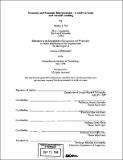Economy and semantic interpretation : a study of scope and variable binding
Author(s)
Fox, Daniel J. (Daniel Judah), 1966-
DownloadFull printable version (17.52Mb)
Advisor
Noam Chomsky, Kai von Fintel, Irene Heim and David Pesetsky.
Terms of use
Metadata
Show full item recordAbstract
This thesis argues that principles of economy play an important role in determining the form of linguistic structures at the interface with the semantic component. The argument comes in the form of a variety of proposals regarding specific mechanisms that are active at this interface. Specifically, I suggest that Economy plays a role in determining relative scope, variable binding, and the form of Operator Variable Constructions. Economy and Scope (chapters 2-3): In these chapters I investigate the scopal properties of sentences that are semantically identical under Surface- and Inverse-Scope (Scopally Uninformative sentences). Based on a variety of empirical tests, I argue for the following generalization: (1) Scopally Uninformative sentences are restricted to Surface-Scope. (i.e. Inverse- Scope is possible only when it is semantically distinct from Surface-Scope.) This generalization argues for an economy condition (Scope-Economy) which rules out semantically vacuous applications of operations (such as QR and QL) which reverse the relative scope of two expressions. Economy and Variable Binding (chapter 4): In this chapter I investigate the scopal properties of sentences that are semantically identical under Local- and Non-local Variable Binding (Binding Uninformative sentences). Using one of the tests from the previous chapters, I argue for the following generalization: (2) Binding Uninformative sentences are restricted to Local Variable binding (i.e. Nonlocal Binding is possible only when it is semantically distinct from Local-Binding.) This generalization argues for an economy condition (VB-Economy) which rules out Nonlocal Binding when it is semantically vacuous (a condition which was suggested on independent grounds in Heim (1993)). Economy and Operator Variable Constructions (Chapters 5-6): In these chapters, I use Binding Theory (BT) to argue that A-bar chains are converted to operator variable constructions under an economy condition which prefers to maintain as much of the material at the tail of the chain as possible for interpretability (OV-Economy). OVEconomy accounts for an observation of Fiengo and May that QR affects BT(C) only when ACD is involved. The discussion yields new evidence that BT applies at LF (and only at LF) as suggested in Chomsky (1993).
Description
Thesis (Ph.D.)--Massachusetts Institute of Technology, Dept. of Linguistics and Philosophy, 1998. Includes bibliographical references (leaves 192-199).
Date issued
1998Department
Massachusetts Institute of Technology. Department of Linguistics and PhilosophyPublisher
Massachusetts Institute of Technology
Keywords
Linguistics and Philosophy